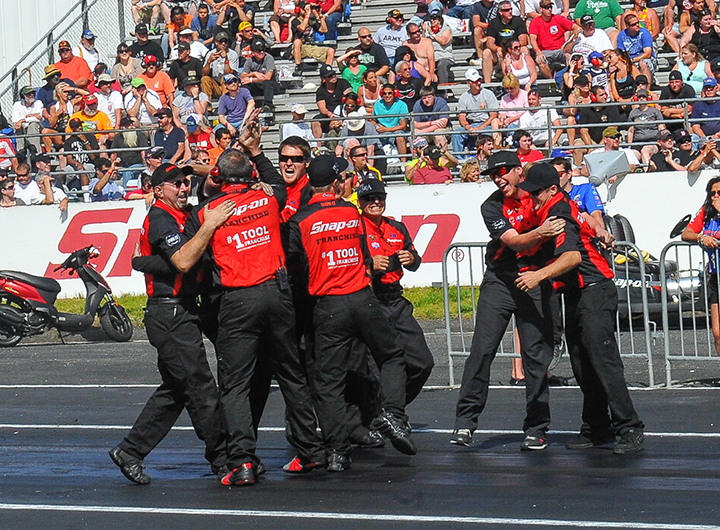
Pedregon’s “No Name” crew celebrates the Englishtown win. (Richard Muir photo)
![]() : Not many people in life choose to live on the ragged edge, like many of you racers do.
: Not many people in life choose to live on the ragged edge, like many of you racers do.
CP: I'm fortunate in that I'm not crying poverty, by any means. My car has fresh equipment. You can't perform at a high level with worn-out equipment. I will say the car is very wealthy. The car is a spoiled brat. It has the latest greatest – I'll put my superchargers, my blocks, my clutch parts, you name it – I will put it up against any car in the field, regardless of ownership. We stack up well. So I don’t want to make it sound like we don’t have the equipment. We do. We have absolutely what we need. And Snap-on makes sure of that. They take care of me in that regard.
The bottom line is I have to make sure the salaries over here are not off the scales, and I've got to do a lot of the work myself. And I enjoy it, to be honest with you. I still enjoy the challenge of it. I still enjoy getting in the car and driving it. When I turn that computer on and it's a bunch of squiggly lines, I enjoy that part of it, too. I would say the part I don’t particularly care for – it's no secret – is the grind of keeping good people on the staff. I mean, the challenging part is every time I turn around, I've got to replace a team member, because he's going over to work for the competition. So that's the part of the ownership that I could do without. But you know, I have to do everything. I have to take the good with the bad.
![]() : You aren't alone, really, in that aspect. Crewmembers leave John Force Racing and Don Schumacher Racing, so they are faced with personnel changes, too. It's part of the sport.
: You aren't alone, really, in that aspect. Crewmembers leave John Force Racing and Don Schumacher Racing, so they are faced with personnel changes, too. It's part of the sport.
CP: Everybody has to go through that, no question. I guess my angle is I can't get in a bidding war. It's almost like the NFL: everybody's a free agent on our team. It's hard for me to compete if a guy's going to be offered $10,000 a year more than I can afford to pay him. I can't go, 'OK, I'll just pay you that and you can stay.' That guy usually goes. I have found that loyalty goes only so far. But I am fortunate that I have been able to keep my core guys together for a while now.
The big teams have this perceived Wonderland. We all face it. I motivate my guys by saying, 'Hey, guys, you can be a part of something—we're the underdogs. We shouldn’t compete with these guys, but we do.' I try to give them that underdog mentality: never say die. And a lot of these guys respond to that. We can go out there, and we can knock heads with the best of the best. And I have found that is a good recruiting tool.


